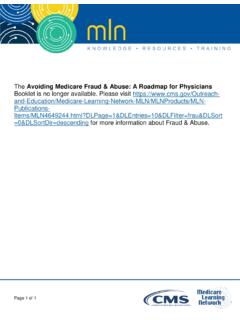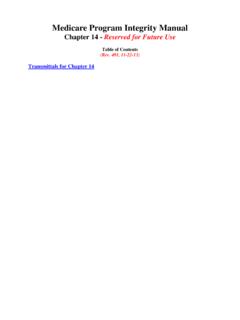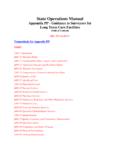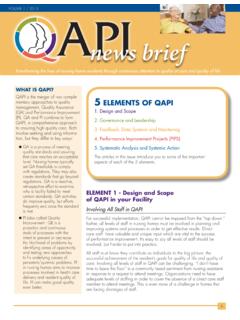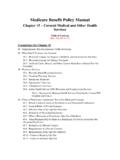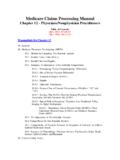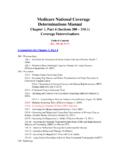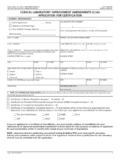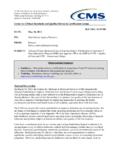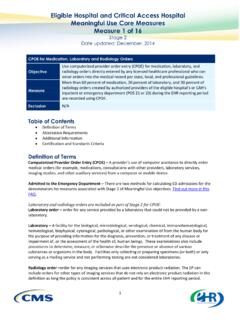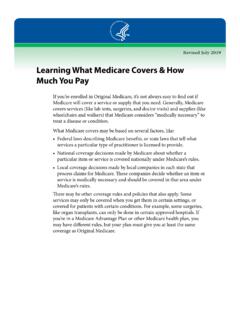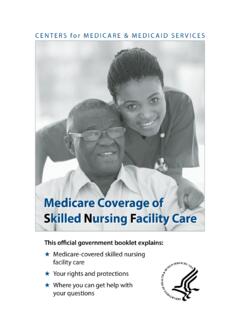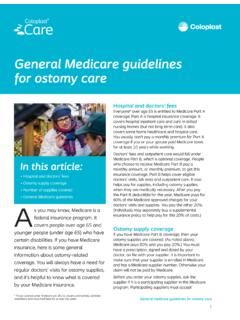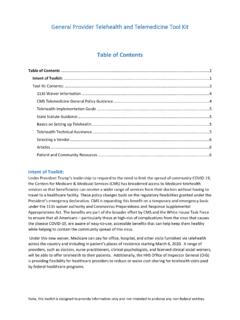Transcription of COVID-19 Frequently Asked Questions (FAQs) on Medicare …
1 Updated: 1/7/2021 pg. 1 COVID-19 Frequently Asked Questions (FAQs) on Medicare Fee-for-Service (FFS) Billing The FAQs in this document supplement the previously released FAQs: 1135 Waiver FAQs, available at A gency-Information/Emergency/Downloads/Me dicareFFS-Eme rgencyQsAs1135 Wai ve We note that in many instances, the general statements of the FAQs referenced above have been superseded by COVID-19 -specific legislation, emergency rules, and waivers granted under section 1135 of the Act specifically to address the COVID-19 public health emergency (PHE). The policies set out in this FAQ are effective for the duration of the PHE unless superseded by future legislation. A few answers in this document explain provisions from the Coronavirus Aid, Relief, and Economic Security (CARES) Act, Public Law No. 116-136 ( March 27, 2020) . CMS i s thoroughl y assessing this new legislation and new and revised FAQs will be released as implementation plans are announced.
2 The interim final rule with comment period (IFC), CMS-1744-IFC, Medicare and Medicaid Programs; Policy and Regulatory Revisions in Response to the COVID-19 Public Health Emergency, is available at the following link: e de ralre gi nts/2020/04/06/2020-06990/me di care-and-medicaid-programs-policy-and-re gulatory-revisions-in -response-to-the- COVID-19 -public The interim final rule with comment period (IFC2), CMS-5531-IFC, Medicare and Medicaid Programs, Basic Health Program, and Exchanges; Additional Policy and Regulatory Revisions in Response to the COVID-19 Public Health Emergency and Delay of Certain Reporting Requirements for the Skilled Nursing Facility Quality Reporting Program, is available at the following link: e de ralre gi nts/2020/05/08/2020-09608/me di care-and-medicaid-programs-basic-health- program-and-exchanges-additional-policy- and-regulatory Table of Contents: A.
3 Payment for Specimen Collection for P urpose s of COVID-19 Testing .. 4 B. Diagnostic Laboratory Services .. 6 C. Diagnostic Laboratory Services - Serology Testing ..11 D. High Throughput COVID-19 E. Hospital Services ..18 F. Hospital Inpatient Prospective Payment Systems (IPPS) Payments ..27 Updated: 1/7/2021 pg. 2 G. Hospital Outpatient Locations off of Hosp ital H. Hospital Outpatient Therapeutic Services Furnished In Temporary Expansion Locations ..44 I. Partial Hospitalization Program (PHP) J. Ambulance K. Ambulance Services- Vehicle and Staffing Requirements for Ambulance Providers an d Sup pliers ..53 L. Ambulance: Data Collection and Reporting Requirements for the Medicare Ground Ambulance Data Collection System ..55 M. Rural Health Clinics (RHCs) and Federally Qualified Health Centers (FQHCs) .. 56 N. Expansion of Virtual Communication Service s for FQHCs/RHCs.
4 60 O. Revision of the Home Health Agency Shortage Area Requirement for Visiting Nursing Services Furnished by RHCs and FQHCs ..64 P. Medicare Telehealth ..65 Q. Physician Services ..82 R. Scope of S. Additional Flexibi lity under the Teaching Physician Regulations ..87 T. Home Infusion Services ..89 U. Medicare Shared Savings Program - Accountable Care Organizations (ACO) .. 91 V. Cost Reporting .. 105 W. Opioid Treatment Programs (OTPs).. 109 X. Inpatient Rehabilitation Facility Services .. 110 Y. Skilled Nursing Facility 113 Z. general Billing Requirements .. 115 AA. Home Health .. 116 BB. Drugs & Vaccines under Part B .. 120 CC. National Coverage Determinations (NCD).. 134 DD. Medicare Payment to Facilities Accepting Government Resources .. 143 EE. 144 FF. Temporary Department of Defense Sites .. 144 GG. Military Treatment Facilities (MTFs) .. 144 HH. Hospice .. 144 II. Ambulatory Surgical Centers (ASC).
5 146 Updated: 1/7/2021 pg. 3 JJ. Diagnosis Coding under International Classification of Diseases, Tenth Revision, Clinical Modification (ICD-10-CM) .. 149 KK. Chronic Care Management Services .. 150 LL. Hospital Billing for Remote Services .. 151 MM. Outpatient Therapy Services .. 154 NN. Durable Medical Equipment Interim Pricing in the CARES Act .. 158 OO. Medical Education .. 160 PP. Applicability Dates of Provisions in Second IFC .. 162 QQ. Indian Health Service (IHS) Hospitals .. 165 Updated: 1/7/2021 pg. 4 A. Payment for Specimen Collection for Purposes of COVID-19 Testing 1. question : What changes did CMS announce regarding specimen collection fees for COVID-19 te sti ng? Answer: As part of the Public Health Emergency (PHE) for the COVID-19 pandemic and in an effort to be as expansive as possible within the current authorities to have diagnostic testing available to Medicare beneficiaries who need it, in the interim final rule with comment period, we are changing the Medicare payment rules during the PHE for the COVID-19 pandemic to provide payment to independent laboratories for specimen collection from beneficiaries who are homebound or inpatients not in a hospital for COVID-19 testing under certain circumstances.
6 New: 4/9/20 2. question : What has been the Medicare payment policy for specimen collection for laboratory testing and for transportation and personnel expenses for trained personnel to collect specimens from homebound patients and inpatients (not in a hospital)? Answer: In general , the Social Security Act (the Act) requires that the Secretary establish a nominal fee for specimen collection for laboratory testing and a fee to cover transportation and personnel expenses (generally referred to as a travel allowance) for trained personnel to collect specimens from homebound patients and inpatients (not in a hospital). The travel allowance is paid only when the nominal specimen collection is also payable. Refer to IOM, Pub. 100-04, Chapte r 16, Se cti on 60 f or more i nf ormati on. For beneficiaries, neither the annual cash deductible nor the 20 percent coinsurance apply to the specimen collection fees or travel allowance for laboratory tests.
7 Ne w: 4/9/20 3. question : How is the IFC changing the Medicare specimen collection and travel allowance policy? Answer: This IFC is providing a specimen collection fee and fees for transportation and personnel expenses known as a travel allowance for COVID-19 testing under certain circumstances for the duration of the PHE for the COVID-19 pandemic. The IFC also describes the definition of homebound for purposes of our specimen collection policy and allowing for electronic records of mileage for the travel allowance for the duration of the PHE for the COVID-19 pandemic. Ne w: 4/9/20 4. question : Who can bill for the Medicare specimen collection fee? Answer: Independent laboratories can bill Medicare through the i r MA C for the specimen collection fee. The specimen collection fee applies if the specimen is collected by trained laboratory personnel from a homebound or non-hospital inpatient and the specimen is a type that would not require only the services of a messenger pick up service.
8 However, the specimen collection fee is not available for tests where a patient collects his or her own Updated: 1/7/2021 pg. 5 specimen. Ne w: 4/9/20 5. question : What is the nominal fee for specimen collection for COVID-19 te sti ng f or homebound and non-hospital inpatients during the PHE? Answer: The nominal specimen collection fee for COVID-19 testing for homebound and non-hospital inpatients generally is $ and for individuals in a non-covered stay in a SNF or whose samples are collected by a l aboratory on be hal f of an HHA i s $ Updated: 4/17/20 6. question : What are the new level II HCPCS codes for specimen collection for COVID-19 testing? Answer: To identify specimen collection for COVID-19 te sti ng, we established two new level II HCPCS code s e f f e cti ve March 1, 2020. Independent laboratories must use one of these HCPCS codes when billing Medicare for the nominal specimen collection fee for COVID-19 testing for the duration of the PHE for the COVID-19 pandemic.
9 These HCPCS codes are: G2023, specimen collection for severe acute respiratory syndrome coronavirus 2 (SARS-CoV-2) (Coronavirus disease [ COVID-19 ]), any specimen source G2024, specimen collection for severe acute respiratory syndrome coronavirus 2 (SARS-CoV-2) (Coronavirus disease [ COVID-19 ]), from an individual in a SNF or by a laboratory on behalf of a HHA, any specimen source We note that G2024 is applicable to patients in a non-covered stay in a SNF and not to those residents in Medicare -covered stays (whose bundled lab tests would be covered instead under Part A s SNF benefit at 1861(h) of the Act). Updated: 4/17/20 7. question : How should a laboratory document the miles traveled to collect a specimen? Answer: An independent laboratory billing Medicare for the travel allowance is required to log the miles traveled. CMS will not require paper documentation logs that some MACs may have otherwise required; electronic logs can be maintained instead.
10 However, laboratories will need to be able to produce these electronic logs in a form and manner that can be shared with MACs. Ne w: 4/9/20 8. question : What is the definition of homebound for purposes of our specimen collection policy? Answer: Medicare beneficiaries are considered confined to the home (that is, homebound ) if it is medically contraindicated for the patient to leave the home. When it is medically contraindicated for a patient to leave the home, there exists a normal inability for an individual to leave home and leaving home safely would require a considerable and taxing effort. Updated: 1/7/2021 pg. 6 As an example for the PHE for COVID-19 pandemic, this would apply for those patients: (1) where a physician has determined that it is medically contraindicated for a beneficiary to leave the home because he or she has a confirmed or suspected diagnosis of COVID-19 ; or (2) where a physician has determined that it is medically contraindicated for a beneficiary to leave the home because the patient has a condition that may make the patient more susceptible to contracting COVID-19 .
